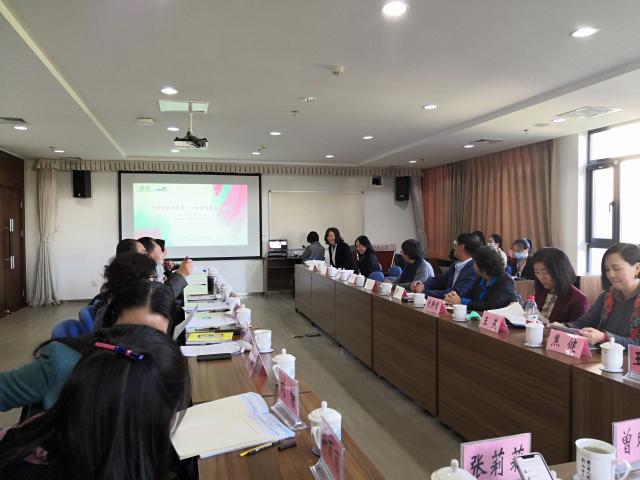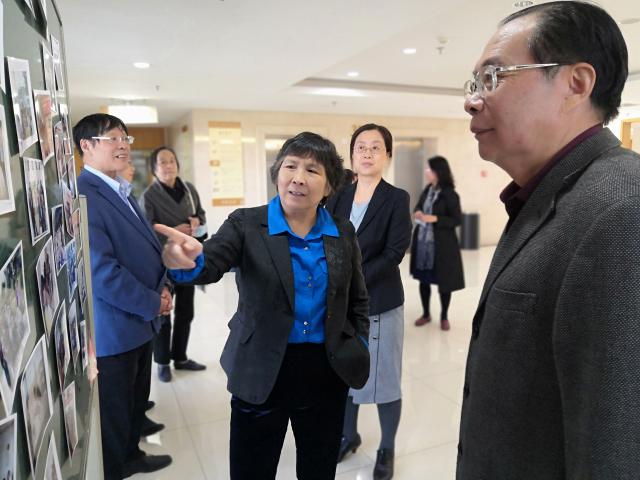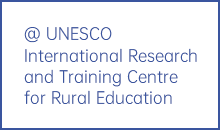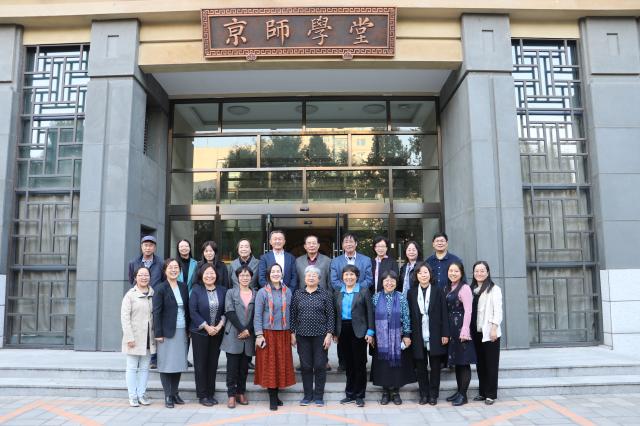Beijing, China, 18 October 18, 2020 - The Symposium on “Girls’ and Women’s Education: Retrospect and Prospect”, jointly organized by UNESCO International Research and Training Centre for Rural Education (INRULED) and the Research Center for Minority Education and Multi-cultural Studies, was successfully held in Beijing Normal University.

The Symposium was presided over by Zeng Xiaodong, Executive Director of INRULED. Jia Nan, Director of the Education Department of the National Committee of UNESCO, and Huang Ronghuai, Director of INRULED, delivered welcome speeches respectively. The symposium was conducted online and on site simultaneously, and 20 participants, including scholars and participants of the 1995 World Women Conference, as well as the new generation of researchers on girls’ and women’s education participated onsite. Based on the video of Professor Peng Liyuan’s congratulatory video speech to the UNESCO Prize for Girls’ and Women’s Education, the participants comprehensively reviewed the achievements made in the field and discussed the topics of girls’ and women’s education in the past; the transformation of the problem domain in the field; the academic future of gender issues and the approaches to gender education research.

The first half of the symposium opened with the topic “a collective memory: girls’ and women’s education in the past”. Participants enthusiastically shared memories from the past. Zhou Mansheng, Vice President of the Chinese Society of Educational Development Strategy and Executive Deputy Director of the Academic Committee, recalled the background, development and personal stories regarding the 1995 Beijing World Conference on Women. Shi Jinghuan, Professor at the Institute of Education of Tsinghua University, and Director of the Global Research Center for the Assessment of College and Student Development of Tsinghua University, proposed that discussions surrounding gender equality and gender mainstreaming reached the peak in the 1990s, while becoming relatively weakened in the following years. Zhou Wei, Researcher at the Teacher Development Research Center of the Shanghai Academy of Educational Sciences, and part-time Researcher at National Center for Education Development Research, reviewed the historical development of girl’s education in China. Guo Xiaoping, education specialist from UNICEF brought up the idea that girl’s and women’s education is the education of humanity. Lan Jian, Researcher at National Institute of Educational Sciences advocated that under the context of lifelong learning, gender issues should be included in the lifelong learning framework outside the schools. Chen Qiong, Director of Beijing Yichuang Philanthropy Development Center for Rural Women, shared her reflections on the roles of the social organizations to empower the female rural teachers and community leaders as the focal points for bringing about social changes. Jiao Jian, Associate Professor at China Women’s University and think-tank expert on children’s work of the Office of the National Working Committee on Children and Women under State Council, elaborated with two cases concerning the gender awareness perceived and emphasized by the nation-level institutions and agencies. However, gender awareness at the community, household and the society level was still marginalized. Zhang Tiedao, Deputy Director of the Chinese Society of Education and member of the Academic Committee of the Chinese Society of Educational Development Strategy discussed the two challenges faced by China’s international education cooperation. The first is the accumulation of the lessons learned from the successful overseas paradigms, namely, the international concepts, mechanism and operational logic of the education cooperation projects. The second is the internationalization and transmission of China’s local experience and knowledge as a reference to the international community.
The second half of the symposium was an in-depth discussion surrounding the topic: “academic future: the approaches to gender education research”. Zeng Xiaodong, Professor of Beijing Normal University and Executive Director of INRULED, first raised two questions: 1. On the occasion of the upcoming Board Meeting of INRULED, under the background of the 25th anniversary of the 1995 Beijing World Conference on Women, how should INRULED continue to deepen and advance projects in the field of girls’ and women’s education? 2. How to better and more accurately implement research projects overseas? Expert participants discussed the questions raised and made suggestions for the future work of the INRULED in the field of girls’ education. Experts suggested that gender-sensitivity could be increased by creating more events in daily work and life; action research could be incorporated into the research methods of girls’ education; some similar studies related to girls’ education can be carried out in cooperation with neighboring countries; researches to explore the influence of women’s lifelong education on children’s education, family structure, and inter-generational education, etc. can be conducted; INRULED’s pilot projects should combine UNESCO’s work mode and international topical issues.
Then, Zheng Xinrong, Professor of Beijing Normal University and Director of the Research Center For Minority Education and Multi-cultural Studies, and Zhang Lili, Professor of Beijing Normal University and Deputy Director of the Research Center For Minority Education and Multi-cultural Studies made concluding remarks. Zheng Xinrong put forward three ideas:1. To make full use of all kinds of strategies, resources and slogans to assure the implementation of gender equality on the ground, to fulfill the commitment to gender equality to the international community. 2. To make a profound reflection on girls’ and women’s education, as even though the numbers of projects and staffs have boosted, motivation and sustainability are lower. 3. To promote more actions, for many good visions have not yet become a reality. At the same time, to adapt to the reality to promote gender equality. Zhang Lili summarized the development of girls’ and women’s education in China since the 1995 Beijing World Conference on Women into 3 stages: girls’ difficulties in acquiring access to education, school dropouts of improvised girls, and girls’ life skills education. It is proposed that in the future, INRULED should take this symposium as an opportunity to sum up past experiences and look to the future.
This year marks the 25th anniversary of the 1995 World Conference on Women in Beijing. In recognition of the outstanding contributions and innovations made by individuals, institutions and organizations in promoting girls’ and women’s education, the Chinese government cooperates with UNESCO to set up the UNESCO Prize for Girls’ and Women’s Education to support the development of girls’ and women’s education in the world. On the occasion of the 25th anniversary of the 1995 World Conference on Women in Beijing, the symposium provides a valuable stage for academic and practical exchanges and collisions for two generations of scholars in the field.














